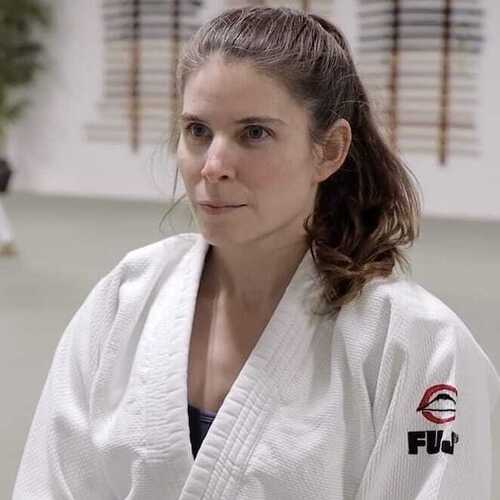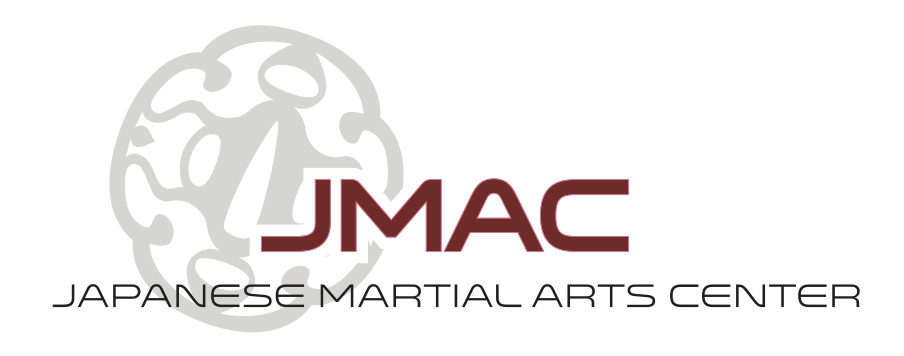I Am JMAC: Ali

About Ali
Ali runs her own lab as a physician scientist (MD, PhD), specializing in the field of endocrinology: "I spend one day a week in the clinic treating patients and the rest of the week in my lab doing research on how the brain controls blood sugar". In her clinic, she treats patients with conditions affecting the endocrine system, including diabetes, thyroid disorders, and osteoporosis. As her own boss, Ali makes her own hours, and typically works 60 hours a week.
Ali has been an athlete throughout her life, with extensive experience in ice skating, gymnastics, running, and swimming. Currently, Ali spends most of her time outside work training in jujutsu and judo and estimates spending 10-12 hours at JMAC each week - "I'm here almost everyday". She describes the flexibility in her work schedule as beneficial for martial arts training, including being able to attend multiple day and evening classes at JMAC throughout the week. In addition to martial arts training, Ali enjoys running and baking on the weekends.
Path to Martial Arts
"I've always been interested in martial arts but didn't have the time to dedicate to it until I finished my medical degree and residency around the end of 2020...and then COVID hit. Towards the middle to end of 2022, when the shutdown was ending, I tried a BJJ class in Ann Arbor. It was a lot of fun, but it wasn't quite the right fit in atmosphere. I kept looking and found JMAC. I watched a class and then took two individual lessons before joining. I really liked seeing how the black belts really helped and supported the white belts, and appreciated the academic environment, formalities, and rituals".
Ali first joined jujutsu classes at JMAC and describes being attracted to the structured format and process of learning through repeated practice of kata (fundamental forms). She describes enjoying the intellectual components of jujutsu, including learning the intricate details of how techniques work.
Ali remembers being interested in judo, but initially felt intimidated by it. "The only judo I had seen was competition judo, where it looked like people were actively trying to hurt each other." She describes becoming more interested in adding judo to her martial arts training after joining Monroe Sensei's noon grappling classes, which are open to both judo and jujutsu students: "It was so much fun. A little uncomfortable at first, because it's different from anything I've ever done, but the safe and supportive atmosphere really helped".
Ali describes her experiences at The JMAC Crucible, a 12-hour intensive martial arts training event, as also providing valuable exposure to judo, increasing her motivation to join and improve her skills. She also remembers watching a video of a smaller female JMAC student doing judo randori (free-style sparring) and thinking, "I can do that".
Favorite Aspects of JMAC
Ali describes her favorite aspects of JMAC as the atmosphere and sense of community. "The senseis have done an amazing job of creating an atmosphere that is welcoming and supportive, but still being serious about training. This in turn makes the students want to help and support each other".
She also notes being attracted to both the physical and mental aspects of martial arts. "Martial arts requires strength, speed, and flexibility and the mental aspect requires a coolness under pressure and the ability to react properly".
Athletic & Martial Arts Experience
Ali comes from a family which heavily emphasized participation in physical activities outside the home as a productive outlet and use of time. "Affinatis have a lot of fire and we do better if we stay physically active. I've been an athlete all my life, and didn't spend a lot of time in the house growing up. My parents believed doing sports would keep my brother and me focused and out of trouble, and it did".
Ali participated in ice skating from ages 6-10, running since age 10, swimming and water polo during high school, and gymnastics during high school and college. She was on the masters swimming team during college and completed several triathlons during medical school, including two half irons.
Personal Challenges
"One of my biggest challenges is being tiny and having training partners that are much bigger than me. Sometimes I've thought, 'this is never going to work'. It turns out that this isn't true and I can make things work as a tiny person." She notes that JMAC senseis have taught ways to modify techniques based on size differences.
Ali observes frequently being in challenging and uncomfortable situations during judo classes, and has benefitted from "pausing" and "taking a couple of breaths". She describes Sunday open mat hours as helpful for working on various techniques and becoming more comfortable with teaching others.
Positive Changes and Growth Since StartingTraining
"I've become physically much stronger since starting judo and have put on muscle. I hate weight training, but it's super important to stay strong as you get older".
Ali also sees improvement in her ability to navigate high-stress situations since starting martial arts, which she describes as especially valuable when managing people at work. "I'm more cognizant during stressful situations and less reactive". She notes learning and applying new strategies for teaching others from JMAC senseis, including Holland Sensei.
Ali describes her experience at JMAC as "life changing". "I'm not super social, but have felt closer to more people at JMAC than outside of JMAC". She credits the natural development of closeness to the necessity of building trusting and supportive relationships with training partners.
